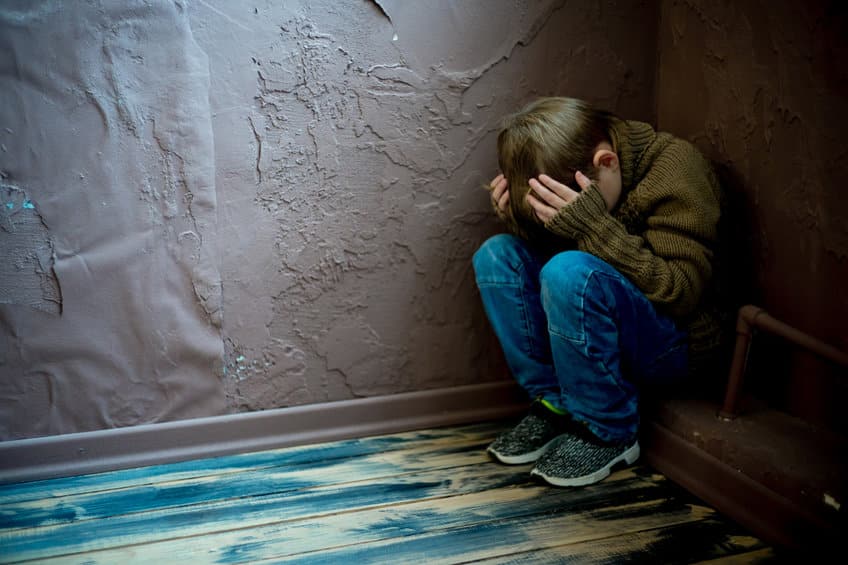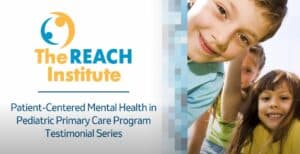Screening for trauma in pediatric primary care
- May 23, 2022
- The REACH Institute
- Assessment & screening, Child mental health Trauma,

Asked the top three things a pediatric primary care provider (PCP) needs to know about child trauma, Brooks Keeshin, MD, said, “Trauma happens. That’s numbers 1, 2, and 3.”
In fact, at least 66% of children experience trauma by the time they are 16, according to the US Substance Abuse and Mental Health Services Administration. A large body of evidence indicates that childhood trauma affects physical and mental health, both short term and long term.
Dr. Keeshin, a child abuse pediatrician and child psychiatrist, is developing a new REACH Institute course to teach PCPs to assess and treat child trauma.
“Trauma reactions can look like other mental health conditions,” said Dr. Keeshin. “Traumatic stress can present with symptoms of ADHD, depression, or anxiety. If the pediatrician knows a child has been exposed to trauma, that changes what they do. But first they need to know.”
“We developed a novel test to find out whether a child has trauma exposure,” Dr. Keeshin said with a smile. “We ask.”
Dr. Keeshin and his colleagues at the University of Utah created a trauma screening process for use in busy primary care settings. (See Resources below.) Depending on the practice and patient population, the process might be part of a standard battery administered at every well-child visit, or it might be added to the toolkit for children who present with mental health issues.
Dr. Keeshin also recommends a simpler method: Describe what trauma is–a scary, upsetting, or violent thing that happens to you or to someone else. Then ask, “Has this happened to you/to your child?”
The first consideration, on identifying possible trauma exposure, is whether the child is physically safe. Suicidality or ongoing abuse, for example, must be addressed immediately.
The next question is the extent to which the trauma exposure is affecting the child’s life. Some children will be OK, some will need just a little help, and some will need specific types of trauma-focused support.
“You don’t need to turn an experience into a pathology,” said Dr. Keeshin. “But you do need to know whether trauma is part of the child’s experience. Everything else you do to address the child’s mental health is predicated on that.”
For example, if a patient scores high on a depression or anxiety screening tool, you treat them differently if you know that they have survived sexual abuse.
“We need to identify which patients could benefit from evidence-based trauma-informed treatment,” said Dr. Keeshin. “You don’t just treat ADHD without focusing on the effect of seeing Dad beat up Mom every night.”
Dr. Keeshin gave an example of a PCP treating an eight-year-old whose parents indicate on the trauma screener that she was in a car crash last month. The screener alerts the PCP to say, “I hear you were in a crash. Tell me about that.”
The child says that she sometimes has trouble falling asleep. The PCP responds, “OK, let’s see if you and your mom can come up with ways to help you sleep. Is there something that has helped you in the past?” The child says that, when she was little, her mother used to sit by her bed and stroke her hair. So the PCP and the child ask the mother to do that for a while.
The PCP tells mother and child, “My guess is that in a couple of weeks you’ll be sleeping better. I want Mom to know that you can come back if your sleep doesn’t get better or if something else happens, like thinking about the car crash a lot.”
“That’s an example of a child who needs just a little support,” said Dr. Keeshin. “Trauma-informed treatment isn’t one size fits all. Another child might be perfectly fine. Another child—well, maybe their brother was injured and is still in the hospital, and the patient has symptoms of anxiety or aggression. That child needs evidence-based trauma-informed mental health care.”
Dr. Keeshin cautions that PCPs can’t simply refer trauma-affected patients to any mental health therapist. “You need a mental health provider who is trained in trauma-informed therapy. Otherwise, it’s as if you diagnose an infection and send the parents to the pharmacy without a prescription.”
In advance of assessing for trauma exposure, Dr. Keeshin recommends finding a therapist who is trained in trauma-focused cognitive behavioral therapy or similar trauma-informed approaches. “We want to get each patient to the right treatment,” he emphasized.
“If there isn’t a provider in the community, we can advocate for increasing access to trauma-informed therapy. Once we identify patients suffering from traumatic stress, we want them to get treatment that science shows is effective.”
Brooks Keeshin, MD, is a clinical researcher in the Department of Pediatrics and the Huntsman Mental Health Institute at the University of Utah. He provides clinical care at Primary Children’s Center for Safe and Healthy Families.
Resources
The Child Traumatic Stress Care Process Model (CPM), developed by Dr. Keeshin’s team, provides a road map to prevention, assessment, and treatment of child traumatic stress. The CPM includes the Pediatric Traumatic Stress Screening Tool, with versions in both English and Spanish for children ages 6-10 and for children ages 11+.
The National Child Traumatic Stress Network offers a broad range of information and resources for pediatric professionals and others.
The national certification program for trauma-focused cognitive behavioral therapists offers a search tool called Find a TF-CBT Certified Therapist.
Two open-access articles outline major clinical considerations related to traumatic stress in children:
- Keeshin B, Byrne K, Thorn B, Shepard L. Screening for trauma in pediatric primary care. Curr Psychiatry Rep. 2020;22(11):60. doi:10.1007/s11920-020-01183-y
- Sege RD, Amaya-Jackson L, et al. Clinical considerations related to the behavioral manifestations of child maltreatment. Pediatrics. 2017;139(4):e20170100. doi:10.1542/peds.2017-0100
Categories
- ADHD
- Anti-racism
- Anxiety
- Assessment & screening
- Autism
- Child mental health
- Coding
- Cognitive behavioral therapy
- College transition
- Culturally responsive
- Depression
- Eating disorders
- Foster care
- Grief
- High-risk children & youth
- LGBTQIA
- Medication
- Parents
- Patient communication
- Pediatric primary care
- School refusal
- Sleep disorders
- Suicide
- Trauma
- Show All Categories
Register for courses
“The REACH Institute Video Testimonial: Hilary  ”
”
